Ukraine: either Shevchenko and Vasnetsov, or the inevitable fall into a semi-colonial situation
Submitted by Anonyme (non vérifié)Testament (Zapovit)
When I am dead, bury me
In my beloved Ukraine,
My tomb upon a grave mound high
Amid the spreading plain,
So that the fields, the boundless steppes,
The Dnieper's plunging shore
My eyes could see, my ears could hear
The mighty river roar.When from Ukraine the Dnieper bears
Into the deep blue sea
The blood of foes ... then will I leave
These hills and fertile fields --
I'll leave them all and fly away
To the abode of God,
And then I'll pray .... But until that day
I nothing know of God.Oh bury me, then rise ye up
And break your heavy chains
And water with the tyrants' blood
The freedom you have gained.
And in the great new family,
The family of the free,
With softly spoken, kindly word
Remember also me.
- — Taras Shevchenko,
25 December 1845
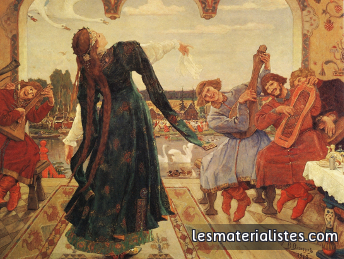 The Ukrainian question has a dynamic which is internal: this is the basis point of view of dialectical materialism. Nothing is more absurd than to resume the recent events as merely produced from the outside. Of course, imperialist forces are playing a game, but it is not possible to understand how this game exists, without understanding the concrete and specific situation of Ukraine.
The Ukrainian question has a dynamic which is internal: this is the basis point of view of dialectical materialism. Nothing is more absurd than to resume the recent events as merely produced from the outside. Of course, imperialist forces are playing a game, but it is not possible to understand how this game exists, without understanding the concrete and specific situation of Ukraine.
For this reason, all the analysis that have been produced in those last weeks in the bourgeois press, or even in the “revolutionary” press, express only an idealist conception of the political process that exists in general. It tends to “complain” about external influences, instead of studying the living reality.
In the case of Ukraine, there are two things that have been particularly forgotten. The first thing is the historical link of Ukraine to the Russian culture. The “maidan” movement in Kiev has been supported by some, in particular the trotskyists, as the expression of a popular movement against the political and economical situation, marked by a submission to Russia, as Russia would be anyway an “enemy” of Ukraine.
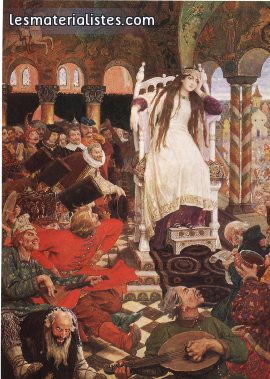 The second thing is the consideration that, in fine, Ukraine would be anyway a part of Russia, and that it would be the right of the Russian nation to integrate territories where Russian speaking people are present. This is the typical point of view of “anti-imperialists”, “Marxist-leninists”, etc., which negates history and the national affirmation of Ukraine, notably with the great 19thcentury artist Taras Shevchenko.
The second thing is the consideration that, in fine, Ukraine would be anyway a part of Russia, and that it would be the right of the Russian nation to integrate territories where Russian speaking people are present. This is the typical point of view of “anti-imperialists”, “Marxist-leninists”, etc., which negates history and the national affirmation of Ukraine, notably with the great 19thcentury artist Taras Shevchenko.
Let's take a look, in an historical materialist way, at the history of Ukraine. One point that must be of course be taken in consideration is the situation of Ukraine in the Soviet Union. When the socialist revolution in October 1917 transformed itself in a civil war – both events forming the people's war in the Russian situation – the Bolsheviks were very weak in Ukraine.
The situation in Ukraine was marked by huge nationalist armed movements, either with the whites, or the anarchist army of Makhno. The ideological power of the small exploitation was very strong, whereas the Bolsheviks were very weak.
The industrialization happened, at the end of the 19th century, only in the eastern part of the country, organized from the top by the Russian empire, whereas the western part remained backward.
With the success of the Socialist revolution and the birth of the USSR, the question of Ukraine was therefore very important, and to build a strong Party in this area, the Ukrainian Lazar Kaganovich was chosen to be the leader.
The position of Lazar Kaganovich is exactly the contrary of the one of the “Marxist-leninists” today. At that time, the communist consideration was that Ukraine was a nation building itself; the Party must be connected to the Ukrainian culture. Lazar Kaganovich spoke therefore Ukrainian, and he has to develop a Party produced by the Ukrainian masses.
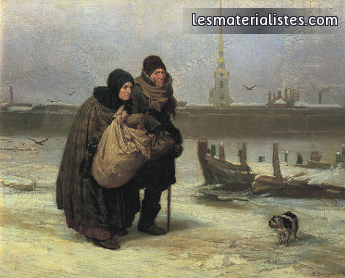
As soon as 1929, nearly all the high school students were studying in Ukrainian, whereas at the same moment, the percentage of people not able to read went from 47% to 8% between 1926 and 1934. There was practically no newspaper in Ukrainian in 1922, there were 373 in 1931 (for a total of 426); the same year there was also 66 theatres in Ukrainian (12 in Yiddish, 9 in Russian), and 83% the books published were in Ukrainian.
The population of the cities became more and more Ukrainian speaking: between 1923 and 1933, the part of Ukrainian speaking people went from 38% to 50% in Kharkov, from 27% to 42% in Kiev, from 16% to 48% in Dnipropetrovsk and Odessa, from 7% to 31% in Luhansk.
In 1923, only 23% of the Communist Party members and candidates to membership were Ukrainian speaking people; in 1933, it became 60%.
It means, practically, that it was the USSR played a major role in the main affirmation of the Ukrainian nation. Ukraine should develop itself as an Ukrainian nation, free from the western imperialist influence.
When we take a look at the present situation, we understand the link to what is happening: the Ukrainian nation is either negated by the Russian state, or is attracted by western forces trying to colonize it.
This is precisely what Stalin explains, in 1926, in a letter to Comrade Kaganovich and the Other Members of the Political Bureau of the Central Committee, Ukraine Communist Party (Bolshevik):
“It is true that a broad movement in favour of Ukrainian culture and Ukrainian public life has begun and is spreading in the Ukraine. It is true that we must under no circumstances allow that movement to fall into the hands of elements hostile to us. It is true that a number of Communists in the Ukraine do not realise the meaning and importance of that movement and are therefore taking no steps to gain control of it. It is true that a change of sentiment must be brought about among our Party and Soviet cadres, who are still imbued with an ironical and sceptical attitude towards Ukrainian culture and Ukrainian public life. It is true that we must painstakingly select and build up cadres capable of gaining control of the new movement in the Ukraine. All that is true (...).
The apparatus of our Party, state and other bodies serving the population can and should be Ukrainised, a due tempo in this matter being observed. But it is impossible to Ukrainise the proletariat from above. It is impossible to compel the mass of the Russian workers to give up the Russian language and Russian culture and accept the Ukrainian culture and language as their own. That would be contrary to the principle of the free development of nationalities. It would not be national freedom, but a peculiar form of national oppression. There can be no doubt that with the industrial development of the Ukraine and the influx into industry of Ukrainian workers from the surrounding countryside, the composition of the Ukrainian proletariat will change. There can be no doubt that the composition of the Ukrainian proletariat will become Ukrainised, just as the composition of the proletariat in Latvia or Hungary, say, which was at one time German in character, subsequently became Latvianised or Magyarised. But this is a lengthy, spontaneous and natural process. To attempt to replace this spontaneous process by the forcible Ukrainisation of the proletariat from above would be a utopian and harmful policy, one capable of stirring up anti-Ukrainian chauvinism among the non-Ukrainian sections of the proletariat in the Ukraine.”
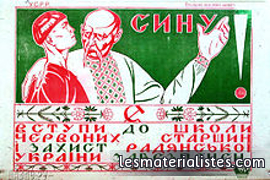 This is why Lazar Kaganovich has been chosen: he was Ukrainian, he wanted to affirm the Ukrainian nation. But he was also Jewish and this was an impediment to the Ukrainian nationalist forces.
This is why Lazar Kaganovich has been chosen: he was Ukrainian, he wanted to affirm the Ukrainian nation. But he was also Jewish and this was an impediment to the Ukrainian nationalist forces.
It was the way of the democratic construction of the nation, rejecting both Russian chauvinism and nationalist tendencies easily submitted to western expansionism.
If we look at Ukraine today, what do we have? We have again those two forces. First of all, we have Ukrainian nationalists. Have they a mass basis? Yes, they have, they are not only some sponsored forces. They express, in a distorted way (which is typically Nazi), the quest for national independence, struggling to break Russia's semi-colonial control.
But as they don't understand the question of semi-feudalism, they uphold an idealist conception of the nation, which turns to mysticism, racialism, etc. One effect is the splitting: there is the fascist party Svoboda, then autonomous forces organized in the “Pravy Sektor” (the “right sector”), then again autonomous forces more radical, etc.
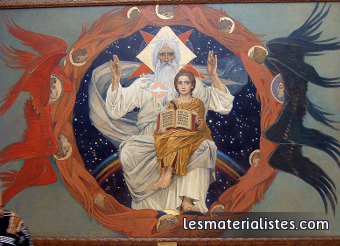 And then, we have people, speaking Russian, used in a chauvinist manner by the Russian imperialism. Of course, there are some genuine people's democratic forces here manipulated, which in fact don't want to rejoin Russia. But they don't understand the question of semi-colonialism, and if it is indeed true that the new Ukrainian government is a fascist one, the former one, linked to Russia, was of the same kind...
And then, we have people, speaking Russian, used in a chauvinist manner by the Russian imperialism. Of course, there are some genuine people's democratic forces here manipulated, which in fact don't want to rejoin Russia. But they don't understand the question of semi-colonialism, and if it is indeed true that the new Ukrainian government is a fascist one, the former one, linked to Russia, was of the same kind...
This makes us come to the main problem of the democratic problematic in Ukraine. Since twenty years, there are huge fascist campaign about the “holodomor”, which should have been an artificially caused famine organized by the communists to kill millions of Ukrainians who refused the collectivization and the USSR. This intense propaganda always goes with antisemitic attacks against Kaganovich.
This became of course a part of the nationalist ideology prevailing in Ukraine; Kiev's Court of Appeal recognized, the 13th January of 2010, the leaders of the “totalitarian” USSR as guilty of “genocide against the Ukrainian national group in 1932–33 through the artificial creation of living conditions intended for its partial physical destruction”.
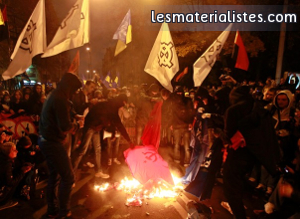 It means that we have here not only a traditional bourgeois accusation against the collectivization, but also a nationalist component in it. The Russian state recognizes the “holodomor” as a part of Stalin's “general crimes” against the people though collectivization, but not as a specific anti-Ukrainian action.
It means that we have here not only a traditional bourgeois accusation against the collectivization, but also a nationalist component in it. The Russian state recognizes the “holodomor” as a part of Stalin's “general crimes” against the people though collectivization, but not as a specific anti-Ukrainian action.
So, Ukrainian bourgeois nationalism uses this a tool to justify the existence of Ukraine as a nation; it is a negative definition, typically fascist, not a cultural one. The cultural dimension missing is compensated with racialism.
In this context, the Ukrainian state and the western Ukraine population nowadays celebrate Symon Petliura, who tried to form a nationalist Ukraine against the red army following 1917, and Stepan Bandera, a bourgeois nationalist allied to Nazi Germany and which goal was to form a country without Jews, Poles and “Moskal” (insulting term for the Russians), through the Organization of Ukrainian Nationalists and then the Ukrainian Insurgent Army.
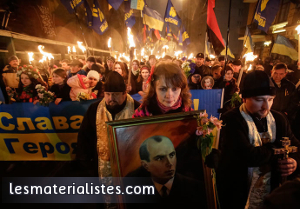 Both Petlioura and Bandera, reactionaries responsible for numerous killings, pogroms against Poles, Jews, etc., fought mainly the red army, but tried to get independent from the white army (for Petlioura) and Nazi Germany. For Bandera, the rupture with Nazi Germany occured of course from 1943 on, when it was clear that Germany would loose and with the trying to link to the US imperialism to form an “independent” and anti-USSR state.
Both Petlioura and Bandera, reactionaries responsible for numerous killings, pogroms against Poles, Jews, etc., fought mainly the red army, but tried to get independent from the white army (for Petlioura) and Nazi Germany. For Bandera, the rupture with Nazi Germany occured of course from 1943 on, when it was clear that Germany would loose and with the trying to link to the US imperialism to form an “independent” and anti-USSR state.
What does it mean? That in fact, we are in the same situation as then. The Ukrainian nation needs a democratic development, that occurred between already between 1917 and 1953. Before 1917 and after 1953, there was the Russian chauvinism, and the Ukrainian nation fought against it. But from 1917 to 1953, the Ukrainian nation was recognized and its culture flourished.
Without seeing the national question though this question of culture, it is impossible not to come to bourgeois nationalism, and now, the Ukrainian national liberation has fallen again in the hands of the western imperialists, who misuse this, helped by the confusion between national liberation and bourgeois nationalism.
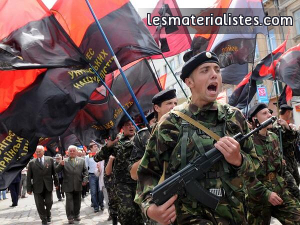 It is very interesting to see that this confusion is deeply rooted. If we take the great Ukrainian poet Volodymyr Sosyura, we can see that in the 1930-1940's, he always oscillated between supporting a democratic Ukraine, with socialism, and bourgeois nationalism.
It is very interesting to see that this confusion is deeply rooted. If we take the great Ukrainian poet Volodymyr Sosyura, we can see that in the 1930-1940's, he always oscillated between supporting a democratic Ukraine, with socialism, and bourgeois nationalism.
We find the same with Viktor Vasnetsov, which was a great painter, a friend of Repin. He died in 1926, as a friend of the USSR, asking to remove his religious works from the churches to bring them to the museums, and at the beginning he did paintings belonging to the realist current.
But he is more famous his works upholding the Slavic romanticism, with an idealization of the past.
Vasnetsov even helped to design the uniforms of the red army, and he is the one who shaped the famous Budenovka hat with the red star on it, inspired from the helmets of the “bogatyrs”, medieval errant knights!
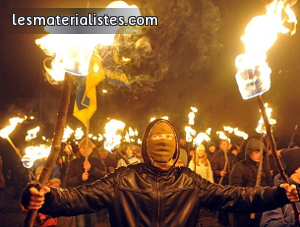 In a way, the situation of the Ukrainian people is the one of Viktor Vasnetsov. The Ukrainian masses want to live free from bureaucratic capitalism, but they only see the question of colonialism. The idealism of fascism is the product of this, with the invention of a “way” to escape to oppression.
In a way, the situation of the Ukrainian people is the one of Viktor Vasnetsov. The Ukrainian masses want to live free from bureaucratic capitalism, but they only see the question of colonialism. The idealism of fascism is the product of this, with the invention of a “way” to escape to oppression.
And in this frame, the Russian minority can't accept, of course, an “ukrainization” based on brutality, racialism, negation of their own experience (which is what it calls “fascism”).
This is, in fact, a situation typical for the country where an important minority exists and must integrate itself in the whole nation. It is clear that, in Ukraine, the Russians will disappear as a national minority, merging with the whole nation, in a process which, at the end, unifies the world masses in a single nation.
Nevertheless, things take time. The approach of the Ukrainian bourgeois nationalism, from Svoboda, the Pravy Sektor, etc. is anti-democratic; its sense of urgency is only the one of western imperialist countries, who want to control this area in a semi-colonial way, with the formation of a bureaucratic capitalism submitted to them.
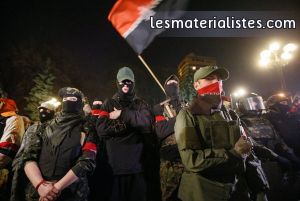 In this sense, the main aspect of the Ukrainian question is not the maidan movement and its support for a coup in Kiev, and it is not even the Russian expansionism using the Russian question in Ukraine.
In this sense, the main aspect of the Ukrainian question is not the maidan movement and its support for a coup in Kiev, and it is not even the Russian expansionism using the Russian question in Ukraine.
The main aspect is the national question in Ukraine, which can be only answered by a democratic revolution, by a people's war breaking with the colonial submission and – this is the most difficult aspect that the Ukrainian revolutionaries must study – the question of semi-feudalism, which blocks the development of the nation that can be only a democratic one and give forces to nationalism, religiosity, fascist idealism.
